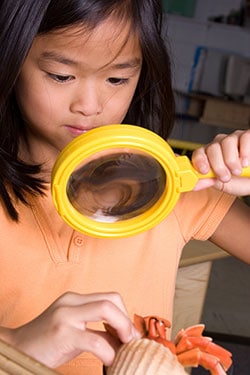Animals in Schools and Daycare Settings

Animals can be entertaining and educational. However, people, especially children, can get sick from contact with animals. The good news: You can help prevent illnesses from animals.
Children can learn a lot from animals, and it's important to make sure they stay safe and healthy while they're learning. People can get sick when they forget to wash their hands[698 KB] right after touching an animal or its habitat. Young children are more likely to get sick because their immune systems are still developing. They also are more likely to put their fingers or other items into their mouths, which can cause them to become infected.
What types of diseases can animals spread?
Animals may carry germs like Salmonella and E. coli O157 on their bodies and in their droppings, even when they appear clean and healthy. The germs can spread to cages, bedding, and wherever animals roam. Disease outbreaks also have resulted from hatching eggs and chicks in the classroom, and from contaminated animal products used for hands-on learning, such as owl pellets for dissection.
Salmonella or E. coli infection might cause vomiting, diarrhea, fever, and stomach cramping. Young children are more likely to develop severe illness from these kind of infections, which could lead to hospitalization and death.
How can I reduce the chance of illness?
- Always wash hands with water and soap right after handling animals, their food, or their habitats (for example, cages, terrariums, aquariums, water bowls, and toys). When around animals, also wash your hands after removing dirty clothes or shoes, before eating and drinking, and before preparing food or drinks.
- Adults, including teachers, should always supervise handwashing for young children.
- Use hand sanitizers if running water and soap are not available. If you only use hand sanitizer, be sure to wash your hands with soap and water as soon as possible.
- Tanks, feeders, water containers, and other equipment used for frogs, lizards, turtles and other amphibians and reptiles should not be cleaned in sinks or areas where food is prepared, served, or eaten.
What else helps prevent illness around animals?
- Reptiles, amphibians, chickens, ducks, and ferrets should not be allowed in daycare centers, schools, or other settings with children younger than 5 years.
- Adults should supervise children's contact with animals. Never allow children to put their hands or objects (including pacifiers) in their mouth while around animals.
- Create specific areas for interaction with animals. Do not allow animals to roam freely around the classroom, especially in areas where food or drink is prepared, served, or eaten.
- Clean and disinfect all areas where animals have been.
- Do not dissect animals or other animal products where food for people is prepared, served, or eaten. Thoroughly clean and disinfect surfaces used for dissection.
- Consult with parents to determine special considerations for children who have allergies, asthma, or other illnesses.
Other Animals Not Recommended in School or Child-Care Settings:
- Nonhuman primates, such as monkeys and apes.
- Wild animals more likely to spread rabies, such as bats, raccoons, skunks, foxes, and coyotes.
- Stray animals and aggressive or unpredictable animals.
- Venomous or toxin-producing spiders, insects, and reptiles. Frogs, snakes, lizards, and other amphibians also may be venomous.
How do I check that animals are healthy before they come into my school or daycare classroom?
- Even though animals appear healthy, they still may spread germs and diseases. Make sure the animals have appropriate veterinary care, a certificate of veterinary inspection, and proof of rabies vaccination, according to local or state requirements.
- If the animal becomes sick or dies:
- Contact your veterinarian.
- Inform the pet store or breeder about the animal's illness or death. Consider waiting before purchasing another pet from the same source.
- Clean and disinfect the cage before reusing with another animal.
























.jpg)












No hay comentarios:
Publicar un comentario